
Direct elections in the Democratic Republic of the Congo occur for the Presidency, National Assembly, and provincial assemblies. The Senate, the upper house of the legislature, is elected indirectly by members of the provincial assemblies.
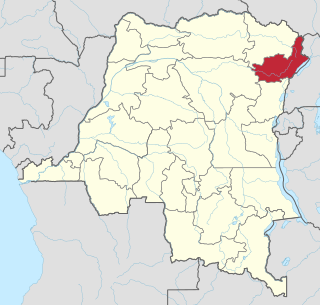
Ituri is one of the 26 provinces of the Democratic Republic of the Congo. Its capital is the city of Bunia.
Julien Paluku Kahongya is a Congolese politician. He serves as the governor of the province of North Kivu, Democratic Republic of the Congo. He has held the position since 2007.

Moïse Katumbi Chapwe is a Congolese politician and businessman. He was the Governor of the Katanga Province, located in the southern part of the Democratic Republic of the Congo, from 2007 to September 2015. He was a member of the People's Party for Reconstruction and Democracy (PPRD) until September 2015. He has been described by The Economist as "probably the second most powerful man in the Democratic Republic of Congo after the president, Joseph Kabila". Jeune Afrique named him "African of the Year" in 2015.

The Republican Guard of the Democratic Republic of the Congo, formerly known as the Special Presidential Security Group, is maintained by President Joseph Kabila. Military of the Democratic Republic of the Congo (FARDC) military officials state that the Garde Républicaine is not the responsibility of FARDC, but the Head of State. Apart from Article 140 of the Law on the Army and Defence, no legal stipulation on the DRC's Armed Forces makes provision for the GR as a distinct unit within the national army. In February 2005, President Joseph Kabila passed a decree which appointed the GR's commanding officer and 'repealed any previous provisions contrary' to that decree. The GR is more than 10,000 strong, and formerly consisted of three brigades, the 10th, at Kinshasa, the 15th, and the 16th, at Lubumbashi. It has better working conditions and is paid regularly, but still commits numerous crimes near their bases, including against United Nations officials.
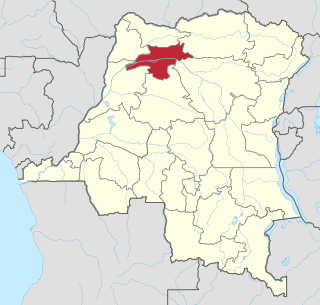
Mongala is one of the 26 provinces of the Democratic Republic of the Congo. Its capital is the town of Lisala.
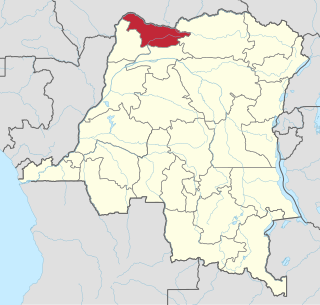
Nord-Ubangi is one of the 26 provinces of the Democratic Republic of the Congo. It is located in the northwestern part of the country on the Ubangi River. Its capital is the city of Gbadolite.

Elections were held in the Democratic Republic of the Congo for 108 seats of the country's Senate on 14 March 2019. Former DRC President Joseph Kabila, who stepped down from office in January 2019 following the inauguration of the recently elected Félix Tshisekedi, has also joined the upper house of the legislature as a senator for life, for a total of 109 seats.
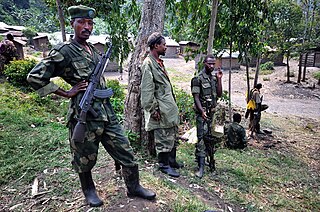
The March 23 Movement, often abbreviated as M23 and also known as the Congolese Revolutionary Army, was a rebel military group based in eastern areas of the Democratic Republic of the Congo (DRC), mainly operating in the province of North Kivu. The 2012 M23 rebellion against the DRC government led to the displacement of large numbers of people. On 20 November 2012, M23 took control of Goma, a provincial capital with a population of one million people, but was requested to evacuate it by the International Conference on the Great Lakes Region because the DRC government had finally agreed to negotiate with them. In late 2013 Congolese troops, along with UN troops, retook control of Goma and M23 announced a ceasefire, saying it wanted to resume peace talks.
Richard Muyej Mangez is a Congolese politician.
Paul Joseph Mukungubila Mutombo is a Congolese religious and political figure. He is the leader of the "Church of the Lord Jesus Christ", established in Kinshasa, Lubumbashi, Kolwezi, Kalemie, Brussels, Paris and Washington DC area. He declared himself "prophet of the Lord" for "the Ministry of Restoration from Sub-Saharan Africa".
The following lists events that happened during 2012 in the Democratic Republic of the Congo.
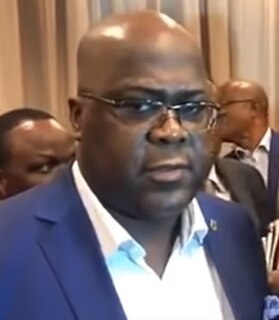
General elections were held in the Democratic Republic of the Congo on 30 December 2018, to determine a successor to President Joseph Kabila, as well as for the 500 seats of the National Assembly and 715 provincial council seats. It was announced on 10 January 2019 that Félix Tshisekedi (UDPS) won with 38.6% of the vote, defeating another opposition candidate, Martin Fayulu, and Emmanuel Ramazani Shadary, backed by the ruling party PPRD. Fayulu alleged that the vote was rigged against him in a deal made by Tshisekedi and outgoing President Kabila, challenging the result in the DRC's Constitutional Court. Different election observers, including those from the country's Roman Catholic Church, also cast doubt on the official result. Nonetheless on 20 January the Court rejected his appeal and declared Tshisekedi as the winner. Parties supporting President Kabila won the majority of seats in the National Assembly. Félix Tshisekedi was sworn in as the 5th President of the Democratic Republic of the Congo on 24 January 2019, making it the first peaceful transition of power in the country since it became independent from Belgium in 1960.
The following lists events that happened during 2016 in the Democratic Republic of the Congo.
Samy Badibanga Ntita is a Congolese politician who was Prime Minister of the Democratic Republic of the Congo from November 2016 to May 2017.

On 20 December 2016 the Democratic Republic of the Congo's president, Joseph Kabila, announced that he would not leave office despite the end of his constitutional term. Protests subsequently broke out across the country, which has never had a peaceful transfer of power since it gained independence in 1960. The protests were met with the government's blocking of social media, and violence from security forces which left dozens dead. Foreign governments condemned the attacks against protesters.
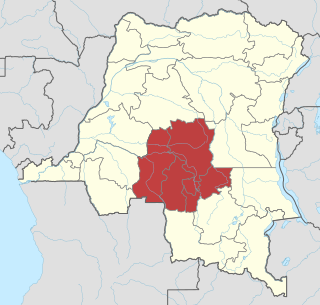
The Kamwina Nsapu rebellion, also spelled Kamuina Nsapu rebellion, is an ongoing rebellion instigated by the Kamwina Nsapu militia against state security forces in the Democratic Republic of the Congo (DRC), in the provinces of Kasaï-Central, Kasaï, Kasai-Oriental, Lomami and Sankuru. The fighting began after the militia, led by Kamwina Nsapu, attacked security forces in August 2016.

Democratic Republic of the Congo–Holy See relations refers to the current relationship between the Democratic Republic of the Congo and the Holy See. The two states have seen an increase in their cooperation in recent years, and due to the large number of Roman Catholics in the DRC, President Joseph Kabila has made an effort to maintain good relations with the Vatican.

Léonard She Okitundu Lundula is a Congolese diplomat who has served as the Minister of Foreign Affairs and International Cooperation and one of the Vice Prime Ministers of the Democratic Republic of the Congo since December 2016. He has formerly held a number of other government offices in the DRC and Zaïre, being the Foreign Minister before (2000–2003), a Senator, and also chief of staff of President Joseph Kabila's administration.

Gubernatorial elections took place in 11 out of the 26 provinces of the Democratic Republic of the Congo on 26 August 2017, with a second round held in three provinces on August 29. Elections in three other provinces were not held until 21 December 2017. The elections occurred after several governors had been dismissed. Applications of potential candidates were submitted to the Independent National Electoral Commission from 21 to 25 July, 2017, with a period for the review of the applications from 26 to 30 July. On August 2, the list of candidates was published and the following two days were granted for any appeals. More than half of the provinces were won by candidates of the Alliance of the Presidential Majority, though some went to independent opposition candidates.
















